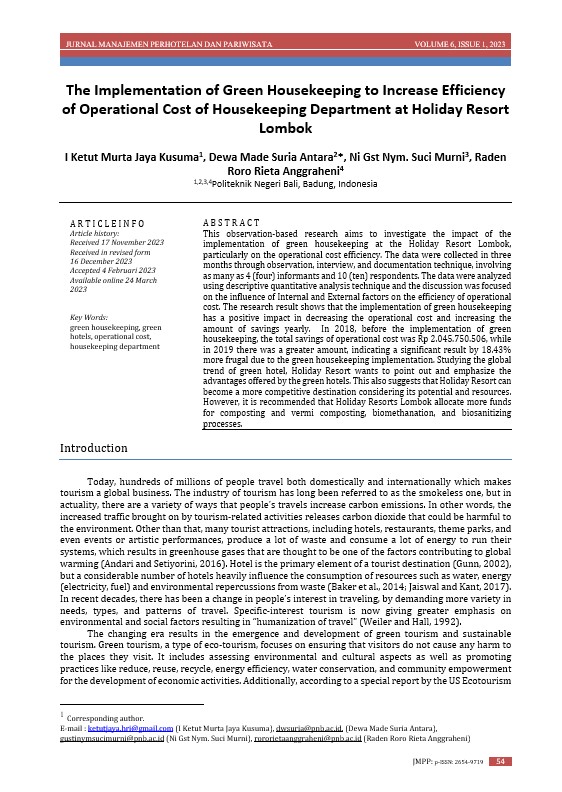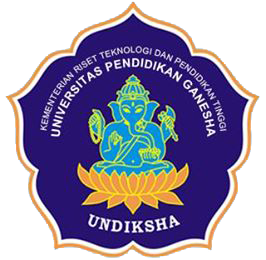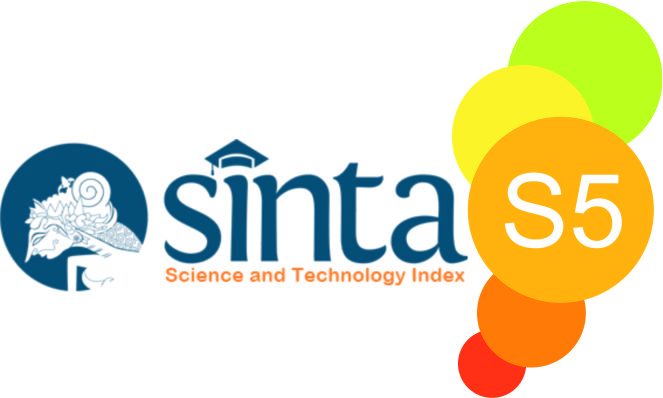Penerapan Green Housekeeping untuk Meningkatkan Efisiensi Biaya Operasional pada Housekeeping Department Holiday Resort Lombok
DOI:
https://doi.org/10.23887/jmpp.v6i1.54185Kata Kunci:
Green Housekeeping, Green Hotels, Operational Cost, Housekeeping DepartmentAbstrak
This observation-based research aims to investigate the impact of the implementation of green housekeeping at the Holiday Resort Lombok, particularly on the operational cost efficiency. The data were collected in three months through observation, interview, and documentation technique, involving as many as 4 (four) informants. The data were analyzed using descriptive quantitative analysis technique and the discussion was focused on the influence of Internal and External factors on the efficiency of operational cost. The research result shows that the implementation of green housekeeping has a positive impact in decreasing the operational cost and increasing the amount of savings yearly. In 2018, before the implementation of green housekeeping, the total savings of operational cost was Rp 2.045.750.506, while in 2019 there was a greater amount, indicating a significant result by 18.43% more frugal due to the green housekeeping implementation. Studying the global trend of green hotel, Holiday Resort wants to point out and emphasize the advantages offered by the green hotels. This also suggests that Holiday Resort can become a more competitive destination considering its potential and resources. However, it is recommended that Holiday Resorts Lombok allocate more funds for composting and vermi composting, biomethanation, and biosanitizing processes.
Referensi
Andari, R., & Setiyorini, H. P. D. (2016). Green tourism role in creating sustainable urban tourism. South East Asia Journal of Contemporary. 11(2), 9. https://doi.org/10.17509/thej.v9i1.16986
Baker, M. A., Davis, E. A., & Weaver, P. A. (2013). Eco-friendly attitudes, barriers to participation, and differences in behavior at green hotels. Cornell Hospitality Quarterly, 55(1), 89-99. https://doi.org/10.1177/1938965513504483
Graci, S., & Kuehnel, J. (2011). How to increase your bottom line by going green. Green Hotels & Responsible Tourism Initiative.
Gunn, C. A., & Var, T. (2020). Tourism planning: Basics, concepts, cases. Routledge.
Rishi Kant, D. J. (2017). The impact of perceived service quality dimensions on customer satisfaction. International Journal of Bank Marketing, 35(3), 411-430. https://doi.org/10.1108/ijbm-04-2016-0051
Ramadhan, M. T. (2020). Environmental friendly concepts in office (Konsep ramah lingkungan di kantor). https://www.academia.edu/43629046/Environmental_Friendly_Concepts_in_Office_Konsep_Ramah_Lingkungan_di_Kantor_
Robinot, E., & Giannelloni, J. (2010). Do hotels' “green” attributes contribute to customer satisfaction? Journal of Services Marketing, 24(2), 157-169. https://doi.org/10.1108/08876041011031127
Rosydi, B. I. (2021). Analisis faktor pendorong penerapan green supply chain management pada UKM makanan ringan Kota Salatiga (Studi kasus: sektor UKM makanan ringan kota Salatiga) (Doctoral dissertation, Universitas Muhammadiyah Surakarta).
Santika, W. G., Antara, D. S., & Harmini, A. A. N. (2013). Memotivasi perilaku hemat energi dan ramah lingkungan di sebuah hotel. Bumi Lestari Journal of Environment, 13(2), 374-383.
Section, W. T. O. S. T. D., & Section, W. T. O. M. I. and P. (2002). The U.S. ecotourism market /The Organization. https://digitallibrary.un.org/record/476376
Suci Murni, N. G., Mudana, I. G., & Suria Antara, D. M. (2017). Ideological discourses on environment in Bali tourism development. International Journal of Applied Sciences in Tourism and Events, 1(2), 104. https://doi.org/10.31940/ijaste.v1i2.658
Sugiyono. (2018). Metode penelitian kuantitatif, kualitatif dan R&D. Alfabeta. Bandung.
Walker, H., Sisto, L. D., & McBain, D. (2008). Drivers and barriers to environmental supply chain management practices: Lessons from the public and private sectors. Journal of Purchasing and Supply Management, 14(1), 69–85. https://doi.org/10.1016/j.pursup.2008.01.007
Weiler, B., & Hall, C. M. (1992). Special interest tourism. Belhaven Press










